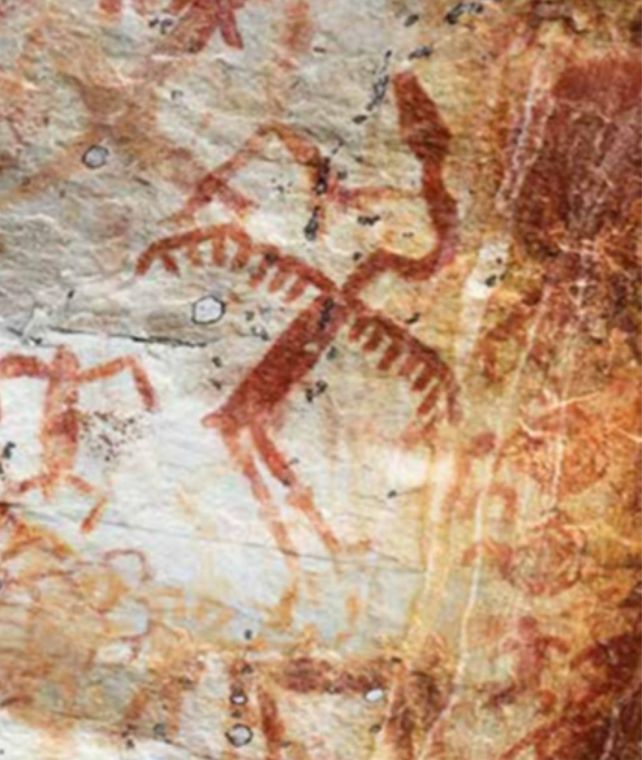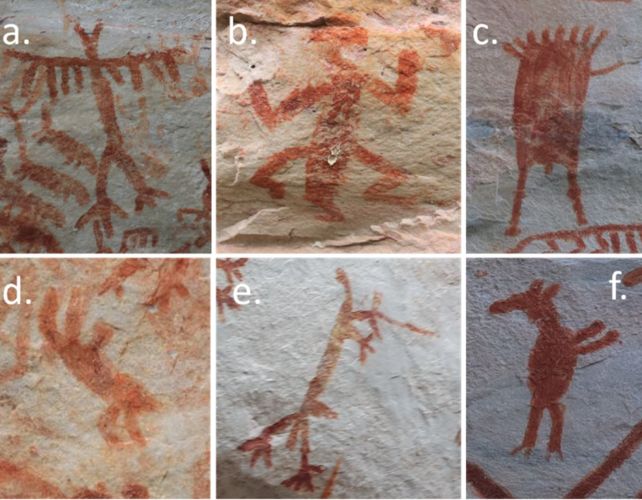Staggeringly numerous rock artwork motifs in galleries throughout what’s right now Serranía De La Lindosa, Colombia, document a historical past of otherworldly beliefs held by the Amazon’s Indigenous peoples.
With the assistance of Indigenous elders and ritual specialists, Colombian and UK researchers lastly documented tens of hundreds of photographs at six of the websites after political unrest and geographical inaccessibility prevented entry for a lot of the final 100 years.
“I have worked with rock art and Indigenous groups on every continent – and never have we been fortunate enough to have such a direct fit between Indigenous testimony and specific rock art motifs,” says College of Exeter archaeologist Jamie Hampson.
The ochre characters, a few of which estimated to be greater than 11,000 years previous, embrace a whole lot of human figures together with a complete ecosystem of various animals, vegetation, and geometric shapes.
The elders and specialists revealed the work aren’t only a document of what the artists noticed round them on the time, however embrace information of ritualized negotiations with the spirit realms. The work embrace scenes of individuals reworking into animals, and even plant/human hybrids.
“Here are the animals that are there, they exist in that mountain range that was formerly and still is, but it is in the spiritual world…” Tukano-speaker Ismael Sierra explains of the work discovered at a web site referred to as La Fuga.
“These are men with two arms, they are giants that exist in that spiritual maloca (house)… there is an animal, a panther lion that has two heads, one head here and the other here, instead of a tail it has a head, they are from the spiritual world.”

Many Amazon cultures characteristic forest spirits that shield the wildlife.
“The release of game and a successful hunt requires negotiation with these spirits,” Hampson and colleagues clarify of their paper.
To bridge the hole between the human and non-human world the individuals painted the animal they want on a rock wall with purple pigment, together with different symbols to signify different requests like for fertility.
Some animals signify people, the group explains. Jaguars are seen as avatars for shamans, for instance, in addition to serving as “mediators between the three cosmic divisions of the world, between life and death, between the human world and the spirit world of the ancestors, and between nature and culture.” In at the very least one of many languages spoken within the space, Desana, the phrase yee means each jaguar and shaman.

“[The collaboration with Indigenous elders] enables us to not simply look at the art from an outsiders’ perspective and guess; we know why specific motifs were painted, and what they mean,” says Hampson. “It enables us to understand that this is a sacred, ritualistic art, created within the framework of an animistic cosmology, in sacred places in the landscape.”
Round the world, disconnection of indigenous artwork from its peoples places historic information prone to destruction. Documenting artwork and connecting its tales with present cultures not solely serves an anthropological objective, it helps indigenous descendants retain their heritage.
Tukano elder Ismael fears for the way forward for the work, having been compelled to depart the realm as a result of human conflicts.
‘Who’s going to keep up [the paintings]?” asks Ismael. “Those that care for you might be spirits… Nobody believes it, however listed below are the spirits… We imagine as a result of my father was a type of [ritual specialists] who interacted with these characters right here.”
This analysis was printed in Advances in Rock Artwork Research.

